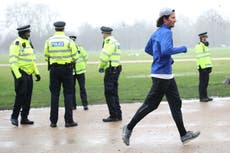Is Boris Johnson being guided by the science or the Tory backbenchers?
As the calls for a rapid rollback of restrictions grow louder, Sean O’Grady considers what’s really behind the government’s decisions – and whether it’ll have implications at the ballot box


Some 62 Conservative members of parliament in the Covid Recovery Group (CRG) have written to the prime minister demanding that Covid restrictions are lifted – for good – as soon as the over-50s have been vaccinated, which may be in a matter of weeks. They want all schools open on 8 March, and pubs and restaurants thriving again by Easter (a literally moveable feast this year, which starts on 1 April). As the daffodils come out, so will the British public, in this scenario. Boris Johnson is trying to deliver it, but he can’t give them a guarantee because the dates the CRG chose are obviously arbitrary, and we’ve been through too many abortive “freedoms days” before. If the CRG were put on God’s earth to make Mr Johnson look sensible, reasonable and driven by science, then the divine plan could not have been more immaculately conceived.
The CRG is yet another Tory parliamentary faction, this one led by Mark Harper, a former Tory chief whip, and Steve Baker, self-styled veteran Spartan of the Brexit wars, and fuelled by the kind of unrelenting chipiness that has caused so much trouble in recent years. Given their numbers, they easily have the ability to overturn the government’s majority and reject any fresh or renewed restrictions on personal and economic liberties that might be put to the House of Commons. Its membership comprises adamantine serial rebels, some with scant respect for the prime minister. Yet the CRG is irrelevant so far as Covid is concerned, but perhaps not so much for the political career of Boris Johnson.
There are a number of fundamental reasons for the government’s continuing hold on political authority. First, and despite the panto jibes lobbed at “Captain Hindsight” and his supposed plan to dismember the pharmaceutical companies, Keir Starmer and Labour will continue to back the government’s restrictions, with the usual plea that they are, if anything, inadequate. No premier wants to rely on an unreliable opposition, but Mr Johnson may not have much choice in the matter, and it’s better than the alternative – the mass slaughter of the Conservative Party’s electoral base.
This is true even if the chancellor, Rishi Sunak, and the Treasury increase the pressure for a relaxation on economic grounds. For all his dither and delay and confused messaging – one day sunny and optimistic about flattening the sombrero, the next glum about the invisible enemy – Mr Johnson will never stray too far from the scientific advice, which is invariably to go slowly and be guided by the trends and the facts. One of the unsung achievements, indeed, of the prime minister is that he has never been publicly rebuked by the likes of Chris Whitty, Jonathan Van-Tam or Patrick Vallance. Beyond some semi-veiled irritation about Dominic Cummings, the experts have chosen to cling to the path of cooperation and realpolitik in their dealings with the cabinet. If they had not, and expressed their doubts, confidence in the government would be even lower than it has been.
The electoral politics of Covid also work greatly in the prime minister’s favour. Covid, as is well documented, tends to kill older citizens and leave the youngsters alone. Another way of putting this is to say that the Tory core demographic is, rightly, the most threatened by, and terrified of, coronavirus. Older voters are the most likely to want vaccination and the most enthusiastic about strict lockdowns, complete with maximum snooping, closing borders and harsh penalties. They are also most likely to be Tories. They are not at all sympathetic to the economy-first libertarian vibe exuded by the CRG or Nigel Farage, and his latest vehicle, the Reform Party (they might even think some of what Labour says has some merit). Many are retired, and thus not directly affected by workplace or school closures, and, while they might like to cuddle grandchildren, they don’t really fancy getting intubated as a result. The Caribbean cruise and the pub lunch can wait. Mr Johnson has little to fear from any grey backlash among his base.
However, Mr Johnson cannot take his own party members – parliamentary or grassroots – for granted. One of the most striking results of the surveys of opinion among activists conducted by Conservative Home is how consistently mediocre the party leader’s ratings are. Obviously personalities such as Gavin Williamson are absolutely bombing, but Mr Johnson is usually easily outpolled by Rishi Sunak and Dominic Raab, the membership presumably sensing Mr Johnson isn’t really up to the job. He has been improving of late, with the success of the vaccine programme eclipsing the Cummings affair and other disasters of 2020. Mr Johnson has also been polling better among the voters as a whole, relative to the leader of the opposition, and the party would probably win an election, albeit narrowly, if one was held tomorrow.
The elections for local, regional and national bodies in May will be a key test for Mr Johnson. Apart from Scotland, he and his party will probably acquit themselves adequately, which might be considered a victory given all that has happened in the last two years. If all goes well, the vaccination programme and testing will suppress the virus at last, the lockdowns will be mostly gone, and the CRG itself will be redundant. His internal critics may desist. Then again, as we’ve nervously been reminded in recent weeks, the virus may have other ideas...


Join our commenting forum
Join thought-provoking conversations, follow other Independent readers and see their replies
Comments